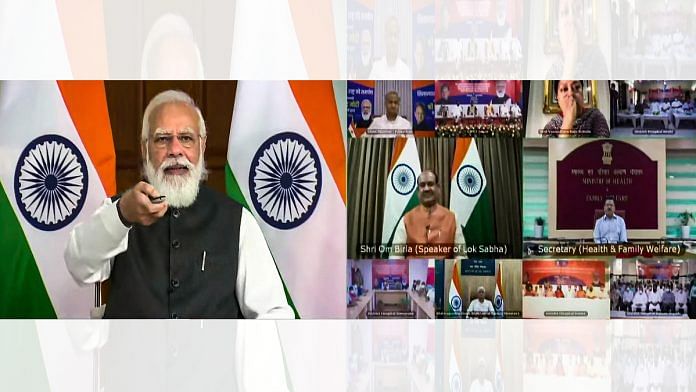Jaipur: Prime Minister Narendra Modi on Thursday virtually laid the foundation stone of four new medical colleges in Rajasthan. He also inaugurated the Institute of Petrochemicals Technology (IPT) located in Sitapura, Jaipur.
The medical colleges are based in Banswara, Sirohi, Hanumangarh and Dausa.
Brief video presentations on the medical colleges and institutes were shown in the programme.
Prime Minister Narendra Modi said the government is making efforts to ensure there is one medical college or an institution for post-graduate medical education in each district of the country.
He also said that the government’s focus is on preventive healthcare, and ayurveda and yoga are being promoted adding that the gap in medical education and delivery of health services is being reduced.
In six years, more than 170 medical colleges have been completed and work on over 100 new medical colleges is going on at a fast pace, Modi said.
Talking about the erstwhile Medical Council of India (MCI), he said that questions used to be raised on its decisions and there were allegations on its transparency. These had an adverse impact on quality of medical education and delivery of health services, the prime minister said.
He said after efforts and many challenges, the government was finally able to bring reform by forming the National Medical Commission in place of the MCI. The impact of the commission is now visible, Prime Minister Modi said.
Modi said when he became chief minister of Gujarat 20 years ago, there were many challenges in the areas of medical infrastructure, medical education and treatment facilities, but he accepted the challenges and tried to change the situation with collective efforts.
He said the shortcomings in the health sector, which he felt as a chief minister, are now being removed in the country.
The Centre worked on a national approach and a new national policy to transform the health sector, Modi said.
Also read: PM Modi chairs 4th Union Council of Ministers’ meeting since cabinet reshuffle in July
“Health is a state subject and I know what difficulties are there, because I was also a chief minister. We worked on that. The problem here was that the health system was divided and there was a lack connectivity and collective approach at the national level,” he said.
“There was also a gap in traditional and modern medicine systems, and the shortcomings in governance also needed to be removed. Therefore, we started working on a new national health policy,” he said.
The prime minister said that from Swachh Bharat Abhiyan to Ayushman Bharat and now, Ayushman Bharat Digital Mission, many such efforts are being made.
Stressing on the need to spread the network of healthcare facilities across the country, he said be it AIIMS or medical colleges it is very important to spread their network rapidly to every nook and corner of the country.
“Today we can say with satisfaction that India is moving from six AIIMS (All India Institute of Medical Sciences) to a strong network of more than 22 AIIMS,” he said.
In 2014, the total seats for under-graduate and post-graduate medical studies in the country was close to 82,000, which has now increased to 1.40 lakh, Modi said.
“The success of the central government’s free (COVID-19) vaccine campaign for all is a reflection of its efforts. Today, more than 88 crore doses of COVID-19 vaccines have been administered in India,” he said.
Highlighting the significance of skilled manpower for the petrochemical sector, he said that a high level of skill will not only increase the strength of India but will also play a big role in realising the resolve of a self-reliant India.
“Skilled manpower is the need of the day for one of the fastest growing petrochemical sector,” he said.
On COVID-19, Modi said that the biggest pandemic in 100 years has taught a lot to the health sector of the world and India has resolved to increase its capacity of self-reliance in this disaster.
Chief Minister Ashok Gehlot and Lok Sabha Speaker Om Birla also addressed the function virtually while Union Health Minister Mansukh Mandaviya was present in the function held at CIPET in Jaipur.
Union ministers Gajendra Shekhawat, Bhupendra Yadav, Kailash Chaudhary, Arjun Meghwal, former chief minister Vasundhara Raje, Jaipur MP Ramcharan Bohra and others also attended the programme through video conference.
Also read: PM Modi’s US trip successful, had substantial exchange with Quad leaders, says envoy Sandhu



